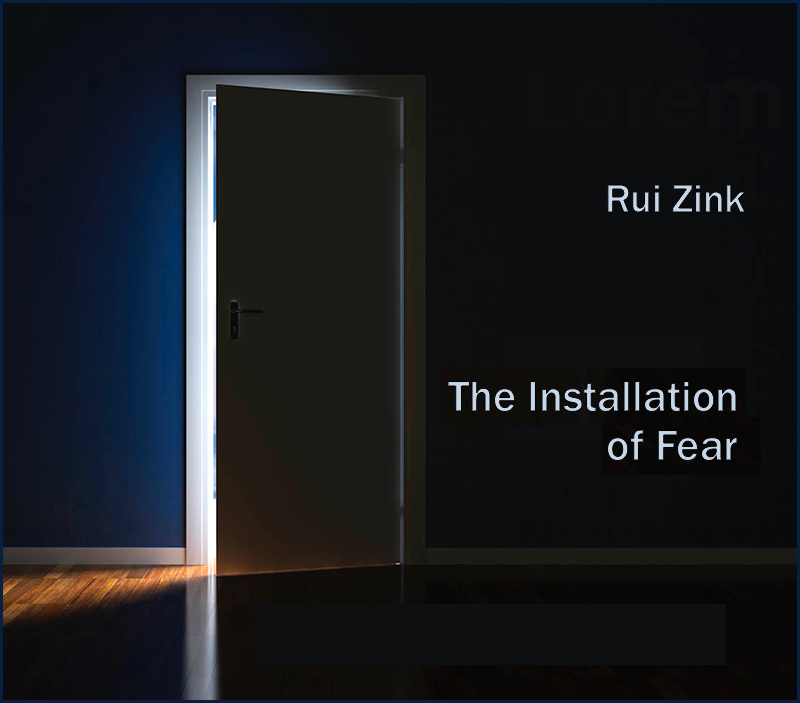A woman hears knocking and opens the door to her apartment. In the hallway stand two rather nondescript men. They have been working door to door today, installing Fear in the apartment building, and now they have arrived to install Fear in her home too. She had forgotten the appointment, and is reluctant to let them in because she has someone inside that she must hide. Carlos and Sousa, the Fear Installers, notice her reluctance and so, not letting her get a word in edgewise, they begin their insistent promotional patter.
So begins The Installation of Fear, by Rui Zink, a novel that launched in Portuguese in 2012 and yet seems as prescient as it can possibly be about the current agonistic political dilemma in the U.S. Though still unpublished in English, The Installation of Fear has received wide acclaim in Europe. A theatrical adaptation in Bonn, Germany ran for six months and only closed because of the onset of the Coronavirus pandemic. A French production is scheduled to debut in Avignon in 2021 (Corona-willing, of course). Ninth Letter is proud to be able to introduce the following selection from Rui Zink’s novel to an American audience—especially today, when perhaps our most crucial election in history fast approaches.
—Philip Graham, Editor-at-Large
When the ivory king is in danger,
Do the flesh and bone of sisters
And mothers and children matter?
—Ricardo Reis
At the threshold stand two men. One in a suit and tie, elegant, slender, with a fine nose and lips, holding a technocrat’s briefcase. The other is more stocky, sullen, dressed in overalls, with a toolbox in his massive hands.
“S-sorry, I was running the washing machine, couldn’t hear…”
As soon as she says this, the woman knows that it’s the wrong lie. There are no sounds of a washing machine coming from the kitchen.
The men look at the woman as if they do not see her.
It’s strange. They don’t look threatening. Quite the contrary. The one in the suit even appears to be talkative; the other one, admittedly, is more thickset, with a heavy, absent air.
“Good morning, madam,” says the suited one glibly. “We’ve come to install fear.”
“F-fear?”
The suited man arranges his face to express astonishment. “Didn’t you receive the notice?” He prompts her with his eyes.
The woman bites her lip. “Does it have to be today? I had plans to—”
The suited man, sensible but firm, continues. “Madam, progress doesn’t stop. It’s for the good of the country.”
“That’s true. But it’s just that I wasn’t rea—”
The suited man looks crestfallen. “You don’t mean to say that you’re against the good of the country?”
“I—”
“Or against progress?”
“…”
“Or against fear?”
The woman bites her lip. “No. Of course not…”
![]()
“Madam, you don’t get it, do you?”
“Don’t worry, not understanding is the new understanding.”
“Not understanding is the boss of all understandings.”
“Now that is an understatement.”
“Indeed.”
“The less you understand the better for you.”
“The better for everyone.”
“In any case, if we told the truth nobody would understand.”
“That is why it is best to simplify.”
“For a better future.”
“A better nation.”
“For progress.”
“For the good of the nation.”
“Please note, it works in any given situation.”
“We are sending your son to war in order to offer a better future to our children.”
“We have shut down the service in order to serve you better.”
“Why be hungry when you can go on a diet?”
“God loves us, that is why he punishes us.”
“We are here to serve you, that is why we put you under surveillance.”
“This is going to hurt me more than it hurts you.”
“We want to tell the truth but people can’t handle the truth.”
“We will stop treating you like children the day you stop behaving like children.”
“We have undergone hardships too.”
“Madam, do you know what the captain of the slave ship told the slaves in the hold when they complained of hunger and thirst?”
“That’s right, madam.”
“No grumbling, lads. We’re all in the same boat.”
“And it was the purest of truths.”
“However, it is widely known that slaves only see their own point of view.”
“Bad. Very bad.”
“The world is full of selfish people.”
“Bad. Very bad people.”
“To fight selfishness is precisely why fear has to be installed.”
“So that’s it, madam. Fear, installed well…”
“That’s the thing, it has to be installed well…”
“Fear, installed well, replaces Bad Questions with Fine Replies.”
“By turning us all into children, fear does not reduce us, madam. It elevates us.”
“Fear takes us back to the Golden Age.”
“It’s neat, madam,” says Carlos. “Yields only joy and advantages.”
“And it’s free…”
“As a bonus, with fear comes paranoia.”
Sousa licks his lips: “Ah, paranoia!”
Carlos licks his lips: “Oooo lala! Paranoia…”
Sousa: “It’s a treat!”
Carlos declares: “And people cower.”
Sousa agrees: “They cower.”
Carlos declares: “Fear has this primary effect.”
Sousa frowns. “Excuse me, Mr. Carlos. Isn’t that the side effect?”
Carlos is firm. “No, it’s primary really. It really is primary.”
Sousa, the good brute, accepts. “It is ideal for everyone.”
“More fear = less disorder.”
“More fear = more entertainment.”
“Fear = social peace.”
“Even after having lost almost everything, people always fear losing even more.”
“They fear their sacrifice having been for nothing.”
“The secret is in almost.”
“Having almost lost everything.”
“They think: taking risks will be even worse.”
“Sacrifice is one thing, self-immolation is another.”
“The trick is not spelling out where the risk lies.”
“Letting them guess.”
“Leaving them in the dark.”
“In the dark of the darkroom.”
“Only then may they open their eyes.”
“Open their eyes and see.”
“See that they don’t see.”
“They see that they do not see anything.”
“Not a thing.”
“Zero.”
“Complete void.”
“And then they give in.”
“They break down.”
“They open their eyes to the new reality.”
“They understand what’s best for them.”
“Not to rock the boat.”
“It is enough to tell them: ‘Do not do anything now, it is for the best. Maybe later, discreetly, we will solve your problem.’”
“Discreetly.”
“That’s the secret.”
“The trick.”
“Not to rock the boat.”
“In any case, there aren’t enough life jackets for everyone. Come back later.”
“It was like that on the Titanic with the third class passengers who managed to reach the deck and saw the first class passengers being evacuated first.”
“Which makes sense. First the first class passengers.”
“It is like this on the lifeboat when one of the shipwrecked members discovers that the stoic leader has been keeping provisions of water and biscuits hidden for himself.”
“‘Ssshhh, don’t say anything,’ says the fake hero to the starving companion, ‘I’ll share a bit with you later.’”
“‘Look man, if you denounce me there still isn’t enough for everyone.’”
“‘Basically, we are all in the same boat.’”
“‘And why would you want to destroy whatever remains of the crew’s morale?’”
“‘Yes, why would you do that?’”
“‘Is that what you want, to destroy your starving companions’ morale?’”
“‘Don’t tell me you’re so selfish that you only think of yourself?’”
“And so the shipwrecked companion gives in.”
“People give in.”
“They stop blindfolding their eyes.”
“In order to sell out their eyes.”
“Sold out to neo-reality.”
“To the weight of potential realities.”
“They understand that keeping quiet is best for them.”
“And they sign with a cross.”
“The contract.”
“Any contract.”
“With their sold out eyes.”
“With their defeated eyes.”
“Surrendered to the excellence of the mechanism of fear.”
“Unsurpassed technology.”
“Ah, we know well that the best fears are still the ones made at home.”
“Homemade.”
“Home recipe.”
“There is no fear like that which we suck at the maternal breast.”
“But…”
“Everyone does what he can.”
“If we all did what we could, we would have a better country.”
“A better world.”
“Our critics are hypocrites.”
“They say that they like doubts, but when we install it they don’t like it so much anymore.”
“They only want doubt with ‘the critical spirit.’”
“Or in other words, in their own way.”
“But doubt can—”
“And should—”
“Also be associated with fear.”
“Why does everything have to be so clear—”
“When we can see better with our eyes closed?”
“When we’ll perhaps be even better people if we have fear?”
“After all, diseases are infectious, are they not?”
“Can a disease be caught through a kiss?”
“A clasp of the hand?”
“The truth is—”
“It can.”
“This is the sad truth.”
“Another sad truth: it is not fear that is contagious.”
“People are.”
“Always people.”
“It’s humankind that is contagious.”
“Of course it’s not that we’re saying humanity is a disease.”
“Not necessarily.”
“But the latest research shows that even less infectious diseases are infectious.”
“Like Alzheimer’s.”
“Did you know, madam, they have now discovered that, like the mad cow disease, Alzheimer’s is infectious too?”
“The prions.”
“Recent research, madam.”
“Very recent.”
“The data is yet to be analyzed.”
“But it is possible.”
“Dementia.”
“Dementia is infectious.”
“Or even hereditary.”
“Think about it, madam.”
“Think about it.”
“Because, I assure you, there are already a lot of people thinking about it.”
“Besides, we all think about it sooner or later.”
“Unless we stop thinking.”
“That’s right.”
—Translated from the Portuguese by Rita Ray

Rui Zink (Lisbon, 1961) is a Portuguese writer and university professor. A Instalação do Medo (2012) won the 2017 Utopiales award in France for best European novel and was recently (2019) performed onstage in Germany, under the auspicious title Die Installation der Angst.
